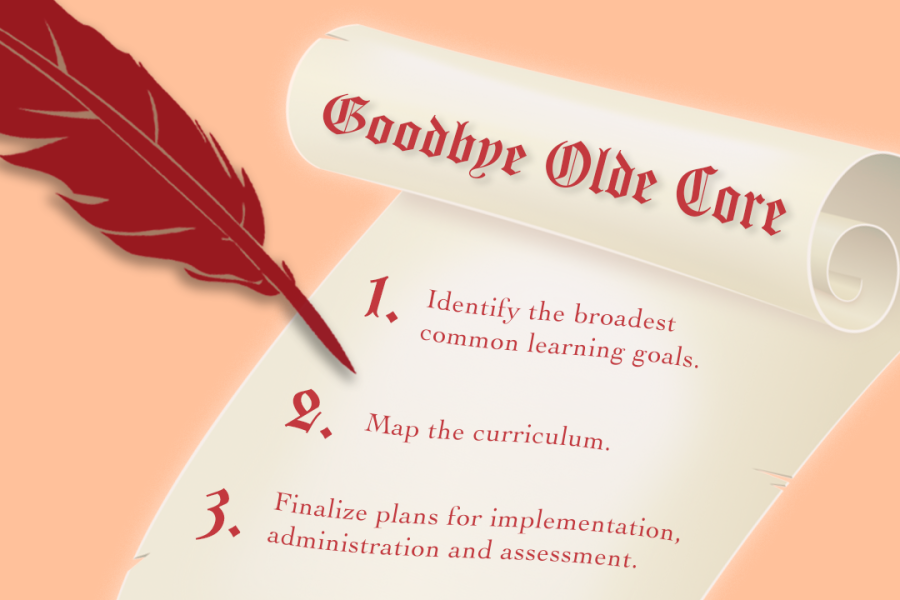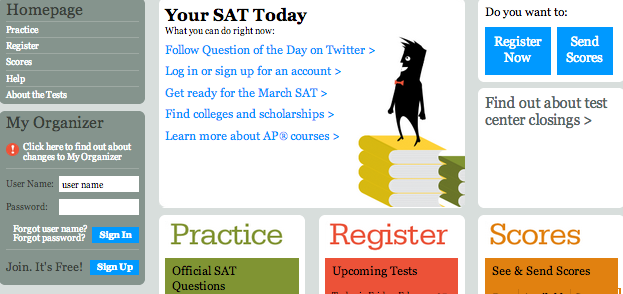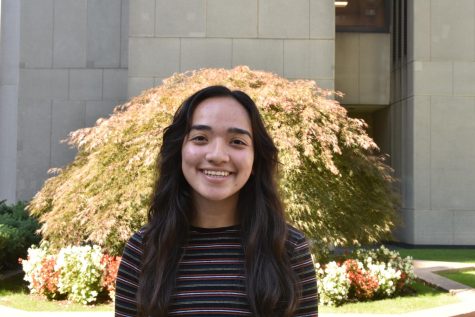Fordham’s Core Revision Is Underway
A major modification of the university’s arts and sciences core curriculum is divided into three stages, the first of which is set to be completed by April
January 25, 2023
The first stage of Fordham’s core curriculum revision is in progress after a nearly three-year effort. The plan to modify the core began during the 2020-21 academic year, and the first stage of its revision is expected to be completed this April. The current core curriculum, instituted in 2008, has been challenged by students and faculty, creating a pathway for its reworking to begin.
The current core curriculum has been critiqued for varying reasons by students across different majors, who cited a lack of attention to diversity and anti-racism in its requirements.
In 2020, ASILI, the Black Student Alliance at Rose Hill, in collaboration with the United Student Government at Rose Hill, proposed the addition of a mandatory anti-racism course to the core curriculum. The student groups advocated for an anti-racism course that would uphold the Jesuit character of the liberal arts core curriculum with the purpose of “bridging the gap between Fordham and its students of marginalized racial and ethnic groups.”
The Diversity Action Coalition also proposed a core curriculum revision in response to the university’s diversity and inclusion mission in 2016. The proposal included a new distributive requirement entitled “Diversity and Society” and a Bronx-focused first-year seminar course. The coalition argued that this would facilitate significant engagement between students and diversity issues from the start of their college careers.
“The core is diverse in that it draws in different perspectives, yet maybe they can draw on specific cultures as much as others. I feel that there is an emphasis on cultures we most often see without really touching on others, unless the course’s theme itself is specific to it.” Amanda Rogers, FCLC ’25
Amanda Rogers, Fordham College at Lincoln Center (FCLC) ’25 and a psychology major, said that she feels the required courses for the core curriculum can be overwhelming. She praised the core’s inclusion of different course materials, but believes that the curricula can be more encompassing of various cultures.
“I think the core is rather dense, in comparison with other colleges and universities,” Rogers said. “The core is diverse in that it draws in different perspectives, yet maybe they can draw on specific cultures as much as others. I feel that there is an emphasis on cultures we most often see without really touching on others, unless the course’s theme itself is specific to it.”
Students studying science, technology, engineering and math (STEM) have voiced complaints regarding the difficulty of completing both core curriculum and major requirements in four years.
Sadiah Choudhury, Fordham College at Rose Hill (FCRH) ’23 and a biology major, said that she appreciated the core’s requirements but noted that her main problem with the university’s core curriculum is the “sheer number of classes” STEM students had to complete on top of the courses that are needed to satisfy her major. She added that the additional workload is difficult in combination with the demands of her other classes.
“A lot of my core classes were actually more difficult than my major classes and had a larger workload, so they prevented me from studying for my STEM classes as much as I would have liked.” Sadiah Choudhury, FCRH ’23
“A lot of my core classes were actually more difficult than my major classes and had a larger workload, so they prevented me from studying for my STEM classes as much as I would have liked,” Choudhury said.
Violeta Juncaj, FCRH ’23 and a student on the pre-health track, agreed with Choudhury on the difficulty of core classes. She said she felt that the material required for the core classes was much more complicated than she had expected and added that the larger writing assignments required by some of the core curriculum courses normally land during the final exam season or close to it, which interferes with her major classes.
Despite concerns and complaints with the core, Rogers said she appreciates certain aspects of the curriculum. She praised the emphasis on writing and the interesting reading material, as well as courses such as “Texts and Contexts: Latinx Speculation.”
“They choose really interesting reading material that sticks with you,” she said. “It also makes you think and broadens your interests.”
As for suggestions in regard to revising the core, Rogers recommended trimming the requirements for STEM majors, as well as avoiding the reteaching of skills that students may have already cultivated in high school in classes such as the English composition series.
According to Auricchio and Mast, the revision committees have placed the core curriculum “on the chopping block” and are expanding the implications that the modifications may have. Auricchio emphasized the importance of the core curriculum and acknowledged that it is imperative to periodically reassess its foundations.
“I think we should try to put an emphasis on making sure people don’t have to elongate their time spent (at Fordham) because they didn’t do a core since they were focusing on their major and then they have to do the core at the very end, losing sight of what they did in their major because it was so far ago,” Rogers said.
As a result of these concerns, the core revision process began with assembling a team of faculty members representing all colleges and disciplines across the university. The advisory board, which was chaired by Robert Hume, associate dean of the faculty of arts and sciences and professor in the political science department, and Kirsten Swinth, professor of history and American studies, published a report outlining the faculty’s argument for revising the core curriculum.
The advisory board, which was disbanded after the stage one committee was formed, worked with Dean of FCLC Laura Auricchio, Dean of FCRH Maura Mast, and the revision committees to oversee the core curriculum’s first steps toward modification.
The report released by the board was supplemented with statistics and feedback from student surveys. According to Auricchio and Mast, the revision committees have placed the core curriculum “on the chopping block” and are expanding the implications that the modifications may have. Auricchio emphasized the importance of the core curriculum and acknowledged that it is imperative to periodically reassess its foundations.
“Fordham is very proud of coming from a 500-year Jesuit tradition, and so the core will always be grounded in those fundamental values — but should also always be responsive to the world as it changes around us.” Dean of FCLC Laura Auricchio
“Fordham is very proud of coming from a 500-year Jesuit tradition, and so the core will always be grounded in those fundamental values — but should also always be responsive to the world as it changes around us,” she said. “I think that’s why any university core should be revisited from time to time.”
In addition to students, Mast and other faculty members also expressed dissatisfaction with the current core curriculum noting that certain requirements the core requires may be structured in a way that doesn’t help students.
Each stage of reworking the core is faculty-driven, though students on either campus will be invited to participate in discussions with revision committees. Employing a backward design model for the revision, faculty committees will first tackle goals and desired outcomes and then move forward with requirement specifics.
“We’re really starting from scratch,” Auricchio said.
She added that the revision committees are focused on the vision and overall goal of the new core, as well as the learning objectives that students should achieve by the end of their collegiate career at Fordham.
She added that the revision committees are focused on the vision and overall goal of the new core, as well as the learning objectives that students should achieve by the end of their collegiate career at Fordham.
According to the report prepared by the initial advisory board, stage one — entitled “Vision” — will “identify the broadest common learning goals for the core curriculum” and connect them to “specific learning outcomes.” Stage two will then entail mapping the curriculum onto the established learning goals and outcomes and choosing a curriculum model. The third and final stage will finalize plans for the new core’s implementation, administration and assessment.
Mast explained that if stage one is successful, a stage two committee will be formed, composed of elected faculty members who will collaborate on redesigning the core through fall 2023.
“Courses will need to be approved, and then phase three will be faster in that it’s just developing a structure for oversight and assessment,” Mast said. “It’s still a year, at least.”
Auricchio underscored the importance of the assessment stage in the core curriculum’s revision plan. She noted that the learning outcomes determined in stage one will serve as the yardstick by which the new core’s success is measured.
“We envision this as a constant process of assessment and improvement,” she said.
Although revision committees of each stage will be working toward benchmark checkpoints, the academic year of the revised core’s implementation is yet to be determined. Whether non-first-year students at the time of implementation will be eligible to take advantage of the revised core is also undecided.
Auricchio and Mast discussed the notion of a rollout plan that offers the revised core to first-years, the traditional procedure by which new undergraduate programs are implemented. Though faculty members of the stage three committee will propose the final implementation plan, Mast acknowledged potential complications of offering two distinct core programs.
“It’s probably going to be a complex change of requirements,” she said. “If we have too much flexibility, then we might not be able to meet what students need. We have limited resources — we are constrained. So, we’ll have to think carefully about the implementation.”
The deans also shared a hope that the core curriculum will no longer serve as a list of requirements that students have to fulfill. They aim for it to be more useful and relevant to the academic experience of students.
“One thing that we are in agreement on, based on the feedback we’ve heard from students, is that, to a lot of students, the core is a checklist of things to be gotten through,” Aurrichio said. “We don’t want it to be that. The faculty doesn’t want it to be that. The students don’t want it to be that.”
According to Mast, the committee working on stage one of the revision process is currently determining the “abilities, skills, perspectives, experiences and mindsets” a contemporary Fordham student should possess and is drafting universal learning goals and outcomes that will guide the stage two committee in designing the new core.
While referring to revisions, Mast said “whether that Fordham student is in Gabelli Lincoln Center, studying biology here at Rose Hill, or English, it’s supposed to transcend departments.”
Insiya Gandhi contributed additional reporting to this story.














